As a vendor of software development services for real estate companies, we follow the tendencies and trends of today’s PropTech market. Not only to guide our clients through their ideas and hypotheses but also to offer some brilliant ideas for startups and SMEs in the industry.
We examine the tendency of many millennials to be priced out of home ownership as they face numerous challenges in their opportunity to buy property. Can we shift this trend?
The real estate industry, traditionally slow to adapt to new trends, is now being forced to address the needs of this generation. As home prices continue to rise and housing affordability becomes a growing concern, millennials seek innovative solutions to overcome the barriers to homeownership. It is where PropTech, or property technology, comes into play. Here at LaSoft, we believe that property rent/buying auctions, which allow tenants to have a slight advantage over landlords, maybe a solution.
Understanding the Millennial Homebuyer Challenge in Europe
Millennials, the largest generation in history, born between 1981 and 1996, are lagging behind previous generations in terms of wealth, including the economic downturn of 2008, stagnating earnings, the pandemic-related economic challenges, and the current rise in inflation and interest rates due to the war and failing politics of developed countries. Although it has been reported that the pandemic influenced the decision of Millennials to return to their parent’s homes to save for a downpayment, the overall tendency depends on many factors and country of residence.
The general tendency is that millennials are priced out of home ownership, with rising home prices outpacing income growth. This affordability crisis has been further exacerbated by economic disparities, with some areas experiencing a severely limited supply of homes for sale. As a result, millennials are often limited to being renters. The real estate industry must acknowledge and address these challenges millennial homebuyers face.
Average Rental Rates in Western Europe
- CH
- 2,623
- IS
- 1,884
- DK
- 1,875
- IT
- 1,850
- FR
- 1,850
- LU
- 1,800
- NL
- 1,800
- DE
- 1,700
- IE
- 1,570
- SE
- 1,540
- PT
- 1,500
- ES
- 1,500
- FI
- 1,340
- CZ
- 1,260
- BE
- 1,100
- AT
- 1,090
- PL
- 1,010
- GR
- 950
- MT
- 900
- NO
- 895
- PL
- 800
- LT
- 800
- SI
- 775
- TR
- 750
- HU
- 675
Source:
Globalpropertyguide
So, what are the specifics of the European real estate market for the past several years towards rentals and households among Millennials? In Germany, 73% of individuals aged 18 to 39 prefer to rent their residences, compared to an average of 44% in the other four Western European countries where YPulse surveys are conducted. For example, less than a third of young adults (28%) rent their homes in Italy. In the UK, young people prefer to stay with their parents and are labeled “Guppies” as they give up on buying their own property. Despite their favorable conditions in the country, UK banks encourage young people to become property owners and offer mortgage programs that don’t need a down payment.
Let’s also examine the situation in the real estate market in Switzerland. We will find that recent survey have indicated that Swiss, just like Germans, prefer to rent rather than do home purchases. Only 40% of Swiss own real estate, compared to 50% of French and 70% of Italians. The state of affairs remains unchanged despite the recent decline in mortgage rates and the declining cost of purchasing real estate per square meter.
It should be highlighted that the “low-priced” proposition in the real estate market is limited, which discourages people from pursuing property ownership. Furthermore, extremely high mortgage rates and property prices over the past few decades have contributed to the public’s perception that housing is difficult to access.
How Many Young Adults Rent Their Home in Europe and the USA?
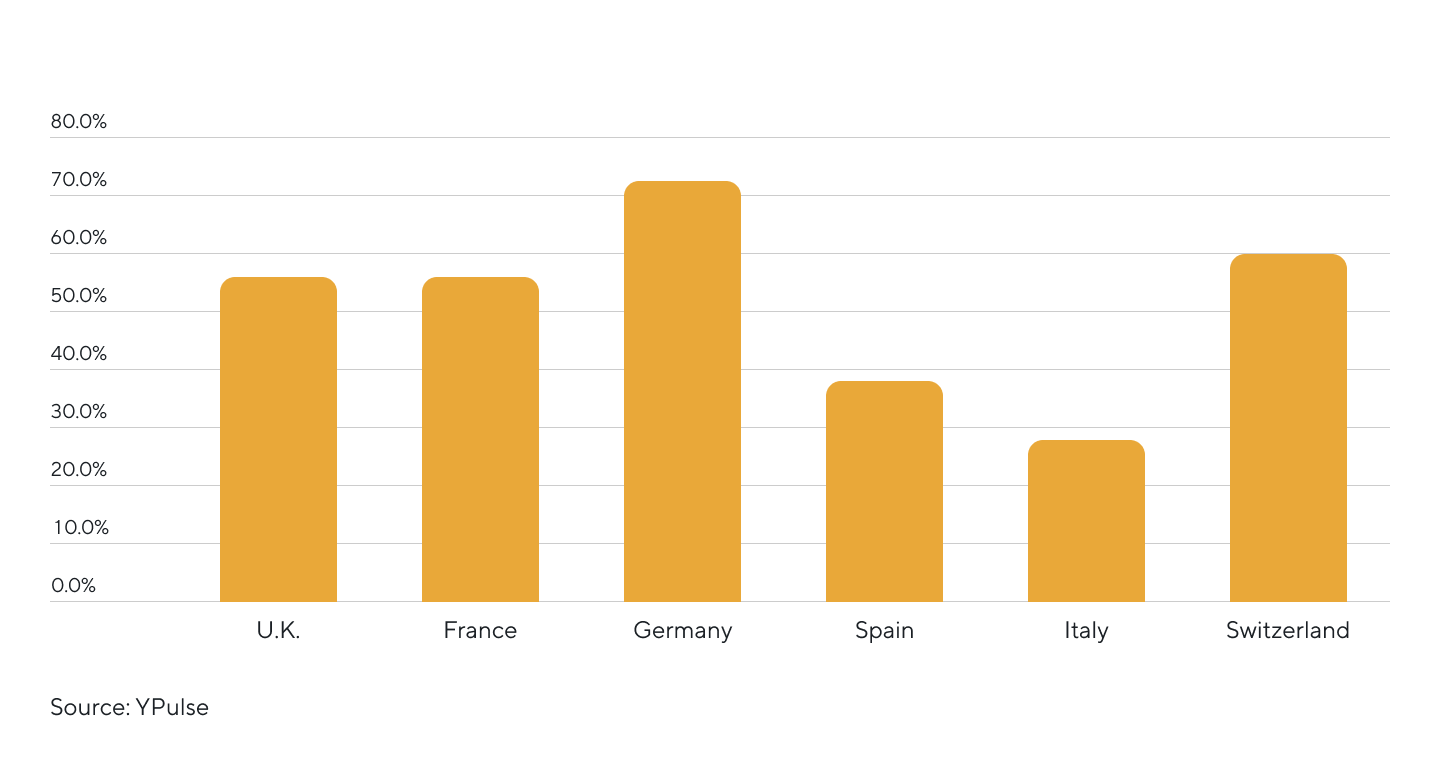
The Impact of Economic Disparities on Millennial Homebuyers in the US
In 2022, the largest generation in the US—Millennials—shifted from being a majority of renters to owners, with 52% being homeowners.
Millennial homeowners have increased by 7 million over the past five years, more than tripling the growth of Gen X, who came in second. Still, as it has been reported, the rest of the Millennials who rent are the most likely to keep renting a home.
As a result, the millennial generation in the USA has become remarkably divided, with over half of them having become homeowners and the rest renters finding homeownership challenging. Since 2018, the Apartment List Renter Survey has been conducted regularly to gather information on the goals and attitudes of millennials regarding homeownership. The percentage of millennial renters who think they will remain tenants forever has nearly doubled from 13 percent in 2010 to 24 percent in 2022.
Millennial Homeownership by State
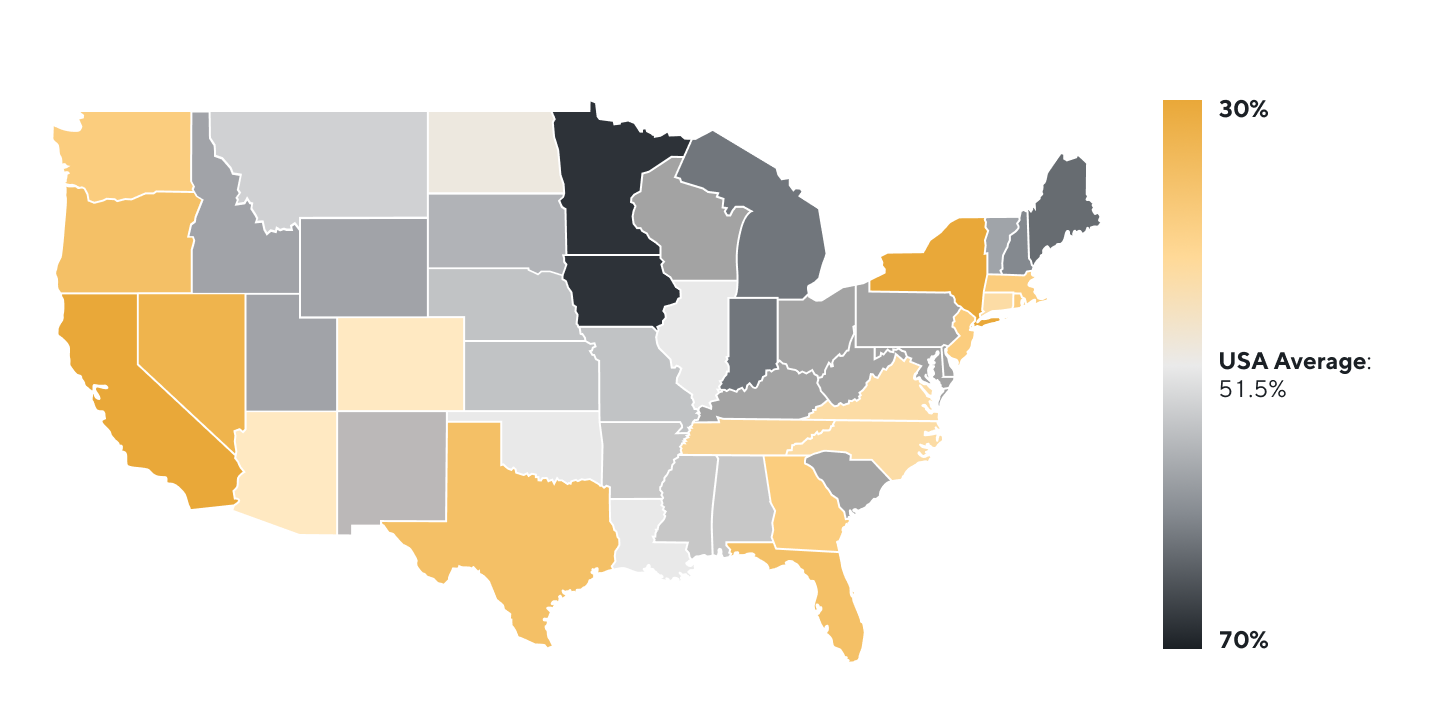
Thus, even though these millennials have always cited affordability as the main reason they intend to rent forever, the advantages renting offers in terms of lifestyle have diminished. Over the previous five years, the percentage of people telling us they will always rent because they believe they will never be able to afford homeownership has climbed from 69 to 74 percent.
For Millennials Who Will Rent Forever, Affordability Outweighs Lifestyle
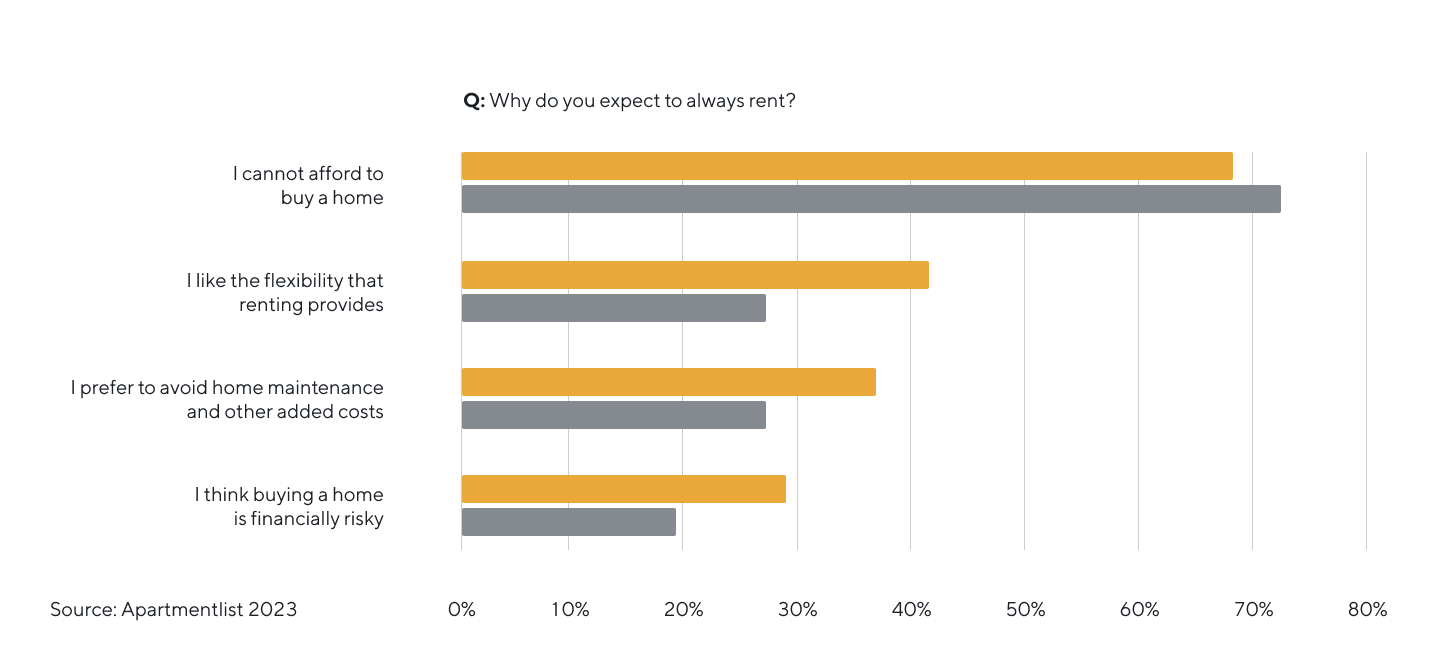
Source: Apartmentlist 2023
The Power Interactions Between Landlords and Tenants
The power interactions between landlords and tenants are another significant challenge millennials face in the housing market. As renters, millennials face difficulties with negotiating rental terms or addressing property management issues. Landlords and property managers hold significant power in these interactions, as they control the supply of rental housing.
The housing affordability crisis has intensified the power imbalance between landlords and tenants. With limited rental inventory and high demand, landlords have the upper hand in setting rental prices and negotiating terms. Real estate is mostly owned by those not under economic scrutiny. Those big real estate private firms or pension funds are often represented by excellent lawyers and sign contracts, which does not leave much room for negotiation with a tenant. This can make it difficult for tenants, especially millennials, to find affordable housing options and negotiate terms. In an increasingly competitive rental market, tenants often need more bargaining power, impacting their ability to negotiate for fair rental rates or address maintenance issues promptly.
Integrating a Proptech Platform Prototype to Connect Landlords with Tenants
We offer a PropTech platform prototype example that any dedicated team can develop to streamline the interaction between landlords and tenants by offering an intuitive online interface where both parties can communicate, manage transactions, and resolve issues related to property rental with ease and efficiency.
Screen 1. Inquiries For Buying a House
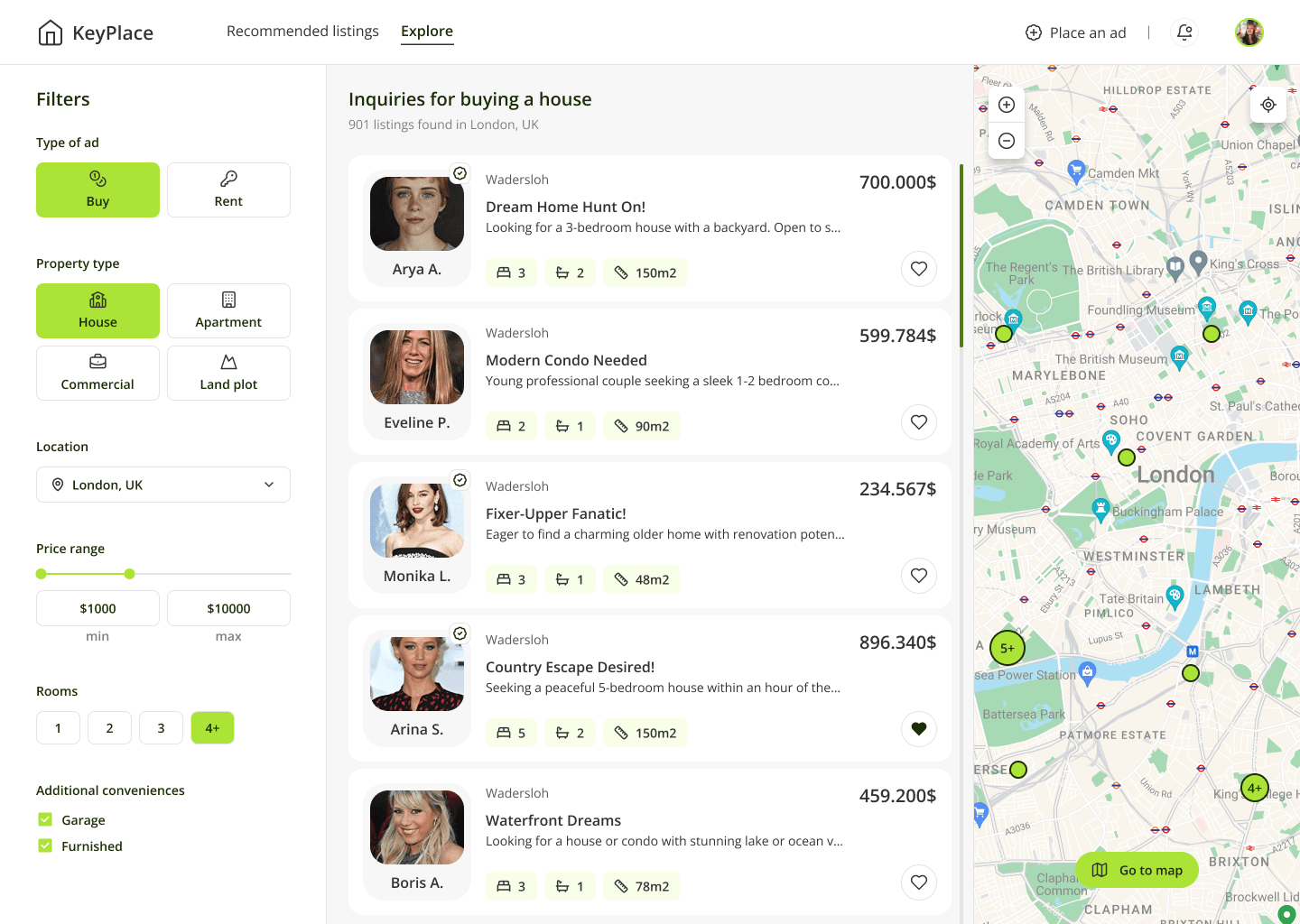
Screen 2. Notifications
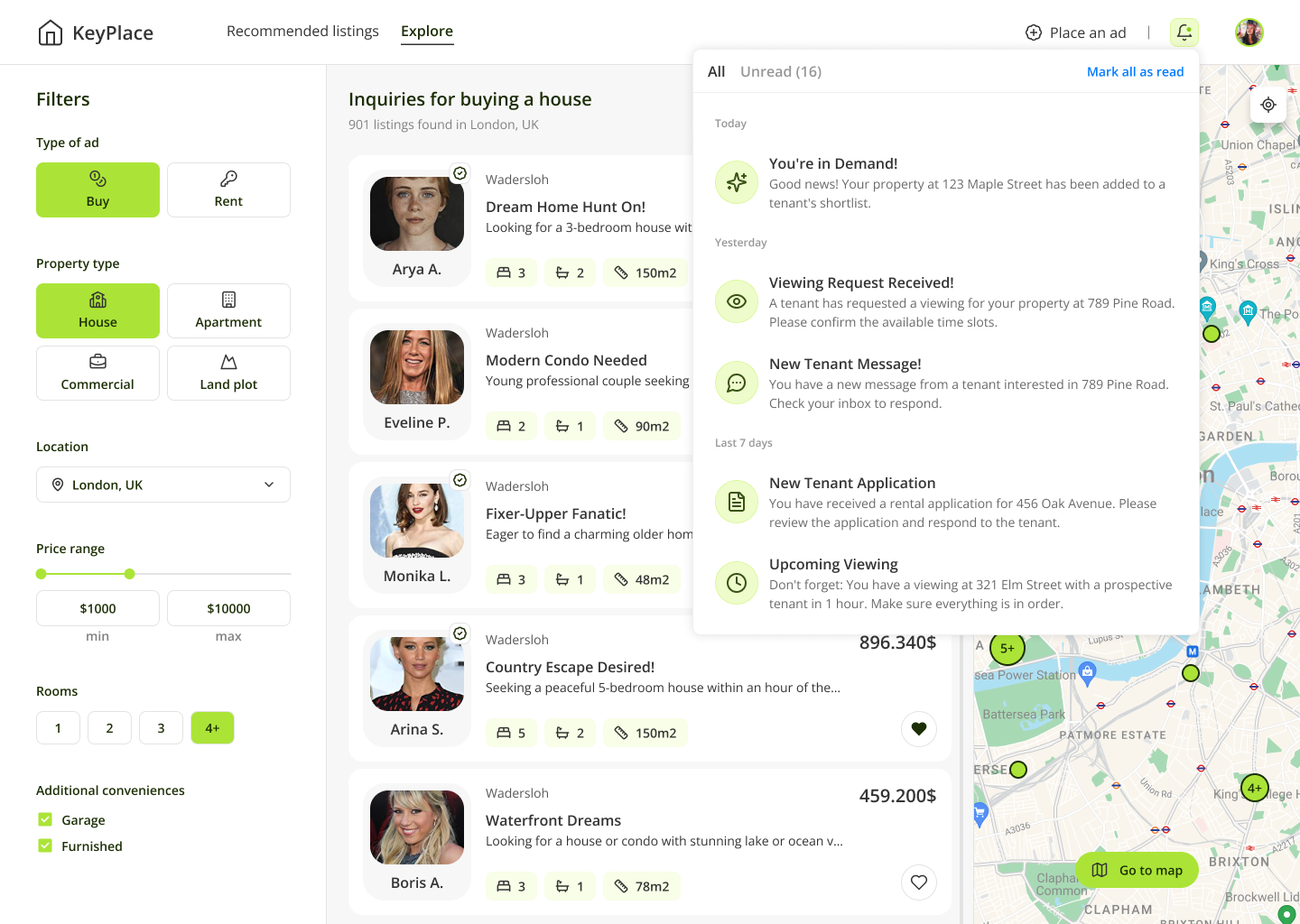
Screen 3. Recommended Listings
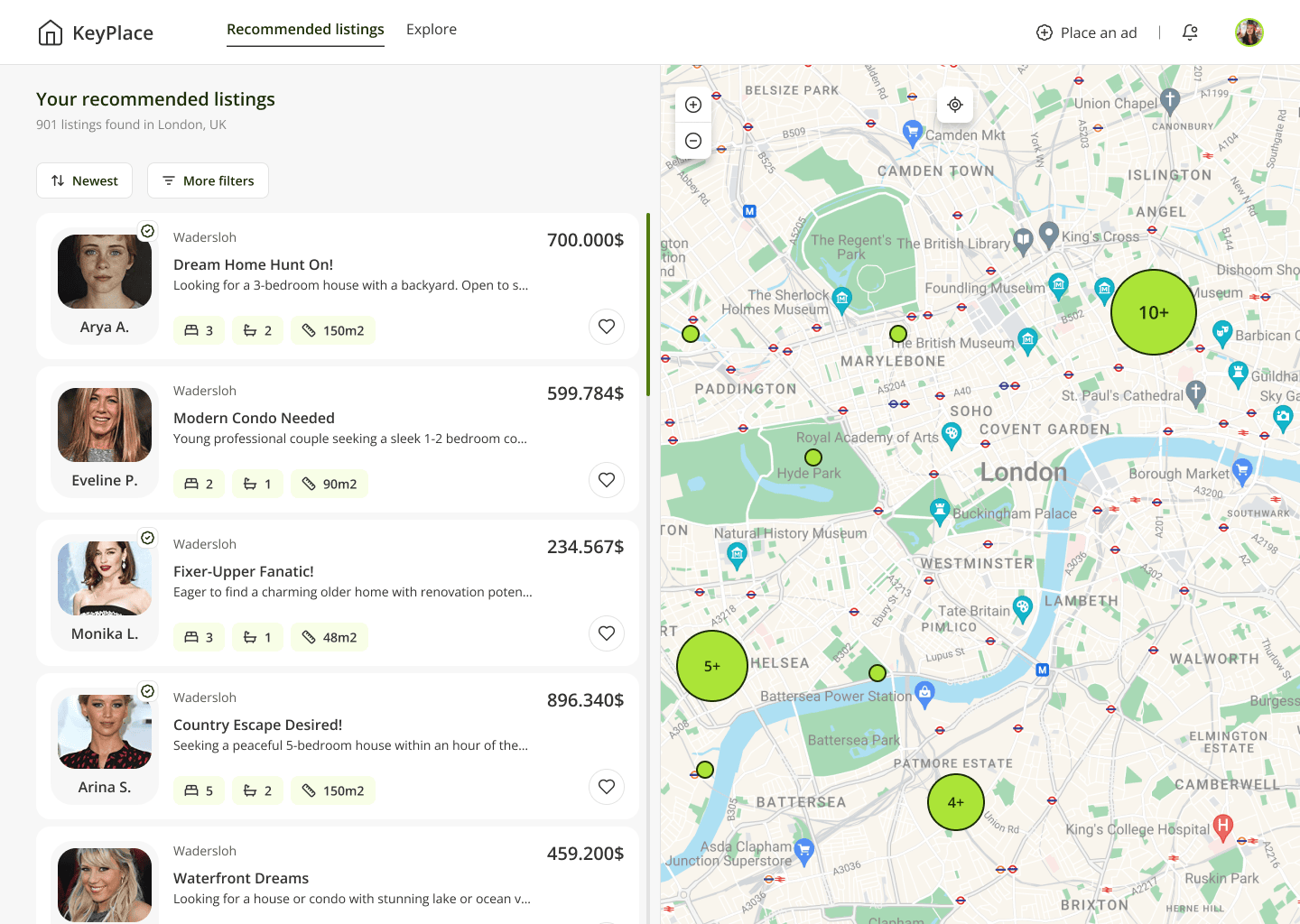
How a PropTech Auction Platform Can Empower Tenants and Homebuyers
In a new tech era of real estate, an auction platform can be a powerful tool to empower tenants and homebuyers. By providing a transparent and efficient marketplace where tenants can articulate their needs and property owners/landlords/real estate agents can showcase their offers, such a platform can elevate how properties are rented or sold.
1. Get an Inquiry From the Prospective Tenant or Buyer:
An auction platform makes finding a suitable property more accessible and convenient for tenants and homebuyers. Instead of searching through numerous listings or relying solely on real estate agents, the user can send his or her inquiry with information about budget, desirable place of living, infrastructure, and comfort conditions.
2. Meet Tenants’ and Buyers’ Needs
Tenants have specific preferences and requirements when searching for a property, such as location, size, amenities, and budget. An auction platform lets tenants articulate their needs upfront, providing property owners and real estate agents valuable insights into their preferences. This feature ensures that tenants are matched with properties that best meet their requirements, leading to greater satisfaction and long-term occupancy.
3. Transparent Market Dynamics:
An auction platform may foster transparency by providing clear visibility into market dynamics. Tenants can see competing offers in real time, enabling them to make informed decisions based on current market conditions and property values.
4. Option to Bid:
An auction platform creates a competitive bidding environment where property owners and real estate agents can showcase their offers to attract tenants or homebuyers. This competitive atmosphere can drive up property interest and increase rents or sales prices, benefiting property owners while providing tenants with various options.
5. Streamlined Transaction Process and E-signing Property Deals:
An auction platform streamlines both parties’ leasing or buying process by centralizing the entire transaction process on a single platform. From property viewing to negotiation and contract signing with electronic signatures, all steps can be facilitated seamlessly through the platform, reducing paperwork, time, and effort for tenants and property owners alike.
6. Real-time Feedback and Engagement:
An auction platform enables real-time feedback, especially with video chat tool and engagement between tenants, landlords/real estate agents. Tenants can ask questions, request additional information, or negotiate terms directly within the platform, fostering open communication and collaboration throughout the leasing or home-buying process. Such communication also helps to avoid fraud on both sides, as the auction guarantees the deal security.
This prop tech solution provides a win-win situation for all parties connecting a tenant or buyer with their dream property. It also guarantees a safe and beneficial solution for all the parties concerned.
FAQ
What generation owns the most property?
The Baby Boomer generation currently tends to own the most property, as they have had more time to accumulate assets and equity over their lifetimes. However, as millennials age and enter their prime earning years, their homeownership rates may increase, potentially shifting the distribution of property ownership.
Source: RentCafe
What is a PropTech firm?
A PropTech firm is a company that specializes in developing and providing technology-driven solutions for the real estate industry. These firms leverage digital platforms, data analytics, and emerging technologies to address various challenges and opportunities within private and commercial properties, ranging from property management to leasing and sales.
What is the largest PropTech company in the world?
The largest PropTech company in the world varies depending on metrics such as market capitalization, revenue, and user base. Some notable examples of leading PropTech companies include Zillow Group, Airbnb, CoStar Group, and Compass.
What is a PropTech startup?
A PropTech startup is a newly established company that focuses on developing innovative technological solutions for the real estate industry. These startups often aim to address specific pain points or inefficiencies within the real estate market by leveraging technology and entrepreneurship. They develop mobile apps, rental platforms, online marketplace, construction sites, etc. They use innovative solutions like machine learning for predictive analytics, artificial intelligence, and cloud infrastructure to avoid real estate wire fraud.
How many PropTech startups are there?
The number of PropTech startups worldwide constantly evolves as new companies enter the market and existing ones grow or pivot their business models. While exact numbers may vary, the PropTech sector has expanded significantly in recent years thanks to technological advancements and rising demand for digital solutions in the real estate sector.
What Are PropTech Startups as a Software Development Solution?
PropTech, a blend of property technology, is transforming real estate services and playing a significant role in addressing millennial homebuying challenges. Proptech platforms can revolutionize how millennials approach homeownership or rentals, from streamlining property transactions to introducing innovative business models.
As a Software Developer, LaSoft dealt with real estate agents developing rental management software. We can give some brilliant tips on settling the problems on the market by creating a PropTech platform that can settle the rental issues of Millennials.
We believe we can cope with this economic problem using an economy-invented solution, so-called “real-estate auction and vice versa.” This platform is where tenants will post their needs, including budget capabilities and landlords, or their agents will have to react to those posts with their offers. The solution can indicate how much Millennials are ready to pay for real estate; it may show demand and be an effective client generation tool for real estate agents.



